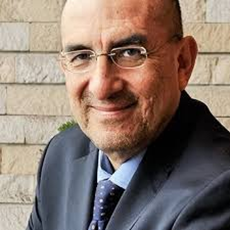
Recognized cancer prevention and control expert Elmer E. Huerta, MD, MPH, joined the George Washington University (GW) Cancer Center, serving as the director of the Cancer Preventorium and as professor of medicine at the GW School of Medicine and Health Sciences.
Huerta is not only an internationally recognized medical oncologist and epidemiologist, but also one of the most trusted voices in the Latin American community when it comes to cancer prevention and control. Over the last 25 years, he has helped nearly 40,000 Washington, D.C.-area patients through in-clinic screening and education, and hundreds of thousands more through his syndicated radio program and other outreach efforts.
He will continue to grow and expand his proven model for cancer control and prevention, focusing on education and outreach, cancer screening, and patient navigation.
“When I was working as a medical oncologist in Peru, many of my patients were dying because they were coming in with cancers that were too advanced,” said Huerta. “I realized their cancers were completely preventable, but my patients were not well-informed, they didn’t know basic facts about cancer prevention or their health, leading to late diagnosis. That’s when I began training in cancer prevention and control and when I started disseminating life-saving messages through the media.”
He brings his “community clinic of the air,” Radio America, to the GW Cancer Center. This daily one-hour radio program produced and hosted by Huerta has informed and educated Latin Americans in the Washington, D.C., metropolitan area on important health issues for nearly three decades. Additionally, Huerta will continue his role as a prominent media figure on Spanish-language radio and television. He is a senior medical contributor for CNN en Español and hosts the most popular Spanish-language COVID-19 podcast in the U.S.
Huerta has done extensive research on community cancer control in Latin American populations and plans to expand this research through clinical trials recruitment and retention at the GW Cancer Center. After finding that African American patients had advanced breast and colorectal cancers at a rate higher than the national average, Huerta demonstrated a startling fact: 99% of those patients had health insurance and lived in Wards 5, 7, and 8. Collaborating with his colleagues at the GW Cancer Center, he will bring his “cancer in the neighborhood” model to GW.



